Module 11 Way of life Unit 3 Language in use 课件 2023-2024学年外研版英语八年级上册 (共27张PPT,含内嵌音频)
文档属性
| 名称 | Module 11 Way of life Unit 3 Language in use 课件 2023-2024学年外研版英语八年级上册 (共27张PPT,含内嵌音频) |
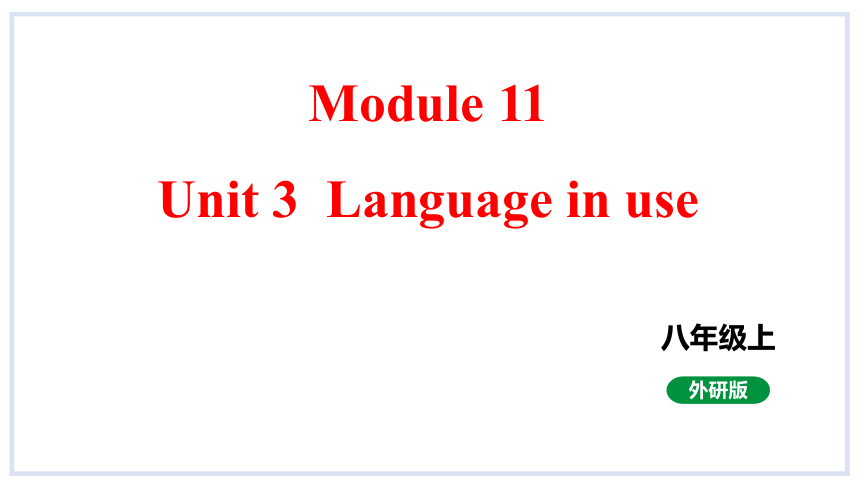
|
|
| 格式 | pptx | ||
| 文件大小 | 20.6MB | ||
| 资源类型 | 教案 | ||
| 版本资源 | 外研版 | ||
| 科目 | 英语 | ||
| 更新时间 | 2024-02-10 11:11:54 | ||
图片预览

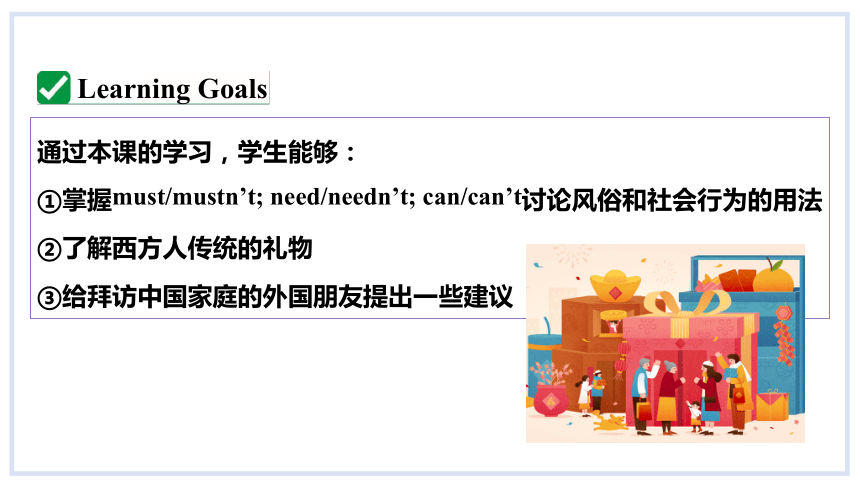
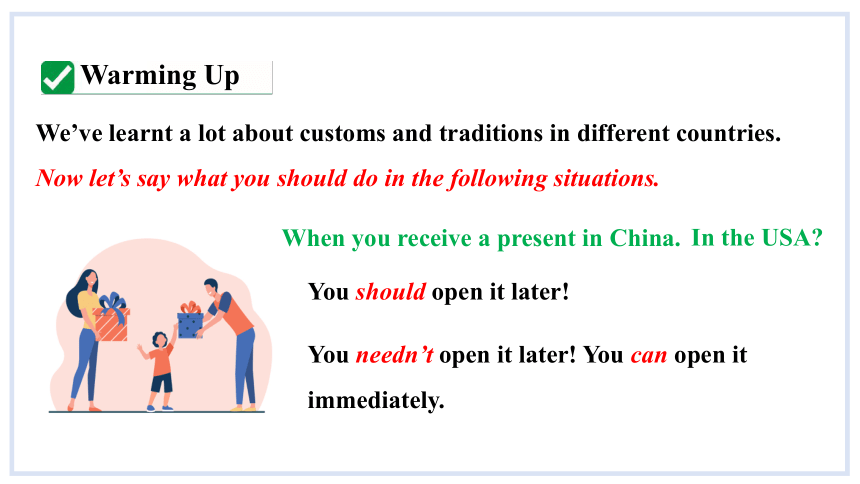
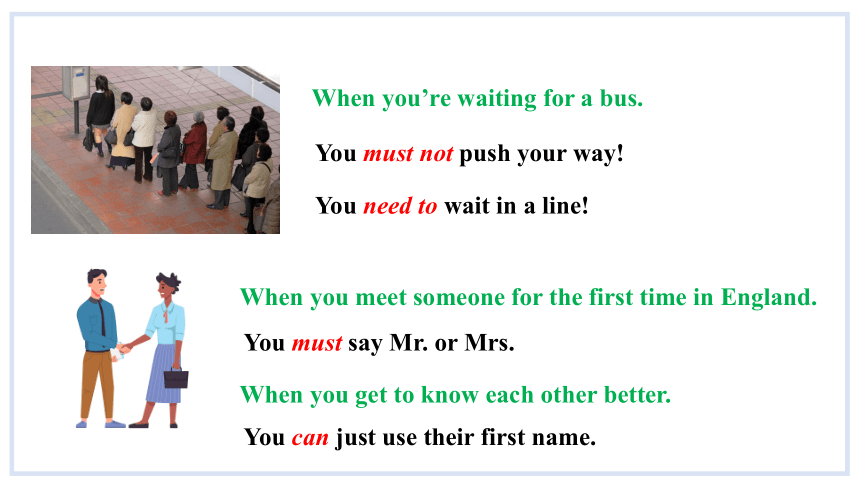
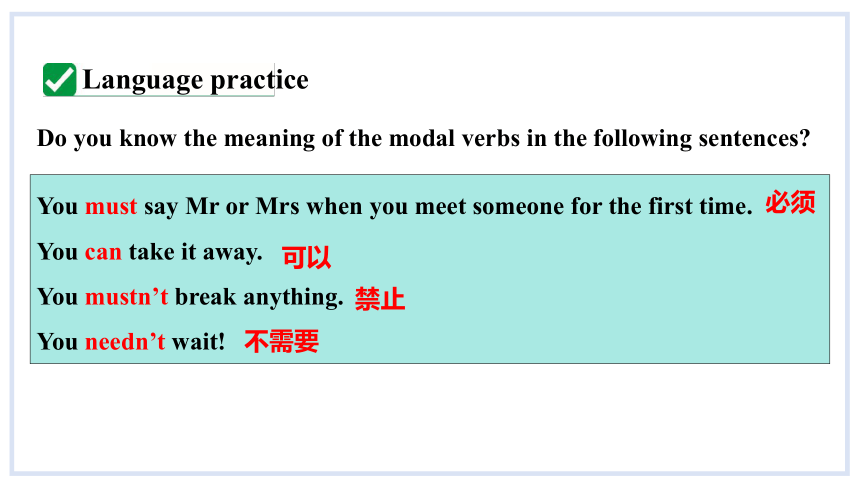

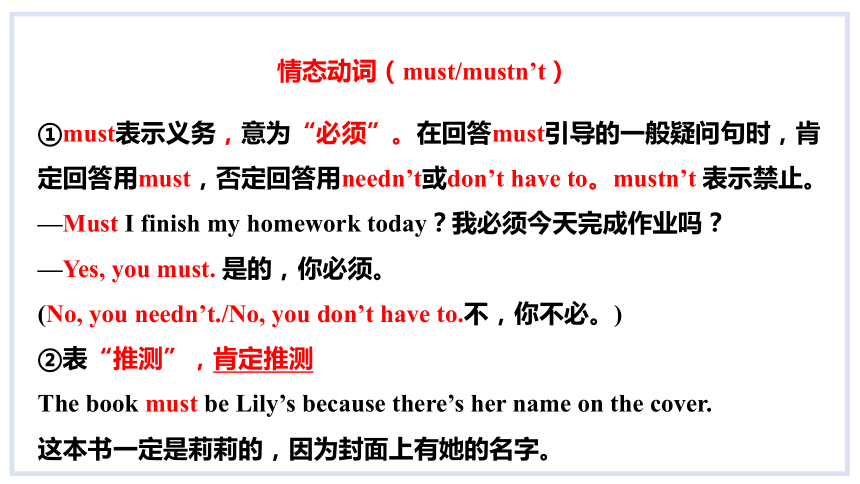
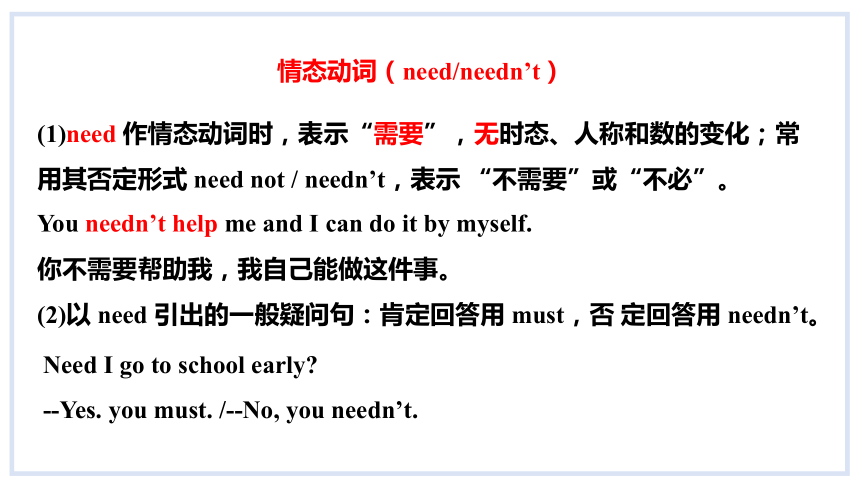
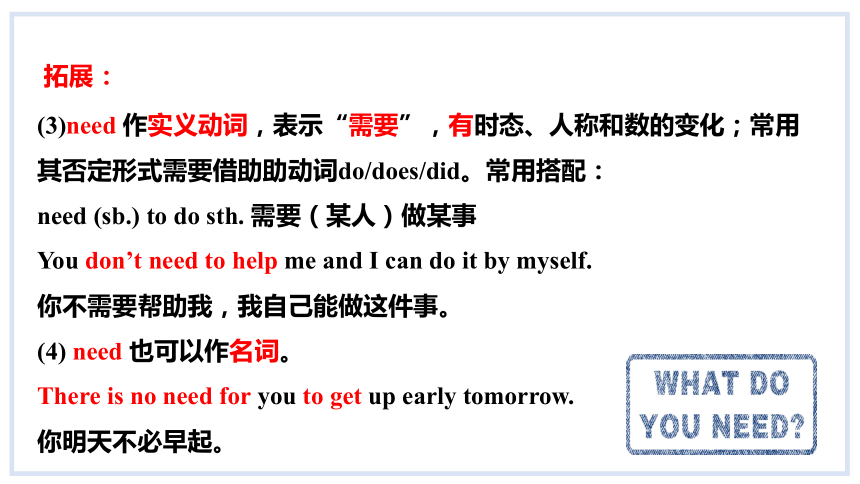
文档简介
(共27张PPT)
Module 11
Unit 3 Language in use
外研版
八年级上
通过本课的学习,学生能够:
①掌握must/mustn’t; need/needn’t; can/can’t讨论风俗和社会行为的用法
②了解西方人传统的礼物
③给拜访中国家庭的外国朋友提出一些建议
Learning Goals
We’ve learnt a lot about customs and traditions in different countries. Now let’s say what you should do in the following situations.
When you receive a present in China.
You should open it later!
In the USA
You needn’t open it later! You can open it immediately.
Warming Up
When you’re waiting for a bus.
You must not push your way!
You need to wait in a line!
When you meet someone for the first time in England.
You must say Mr. or Mrs.
When you get to know each other better.
You can just use their first name.
You must say Mr or Mrs when you meet someone for the first time.
You can take it away.
You mustn’t break anything.
You needn’t wait!
Do you know the meaning of the modal verbs in the following sentences
必须
可以
禁止
不需要
Language practice
情态动词(can/can’t/could)
① 表“能力”(此时could是can的过去式)
I can speak English well now but I couldn’t 10 years ago.
我现在说英语很好但是十年前我不行。
②表“许可”,可表示请求他人许可或许可他人(could 表示委婉语气)
—Could I use your bike —Yes, you can.
③表“推测”
We thought the story could not be true.
It can’t be Mr. Li.
情态动词(must/mustn’t)
①must表示义务,意为“必须”。在回答must引导的一般疑问句时,肯定回答用must,否定回答用needn’t或don’t have to。mustn’t 表示禁止。
—Must I finish my homework today?我必须今天完成作业吗?
—Yes, you must. 是的,你必须。
(No, you needn’t./No, you don’t have to.不,你不必。)
②表“推测”,肯定推测
The book must be Lily’s because there’s her name on the cover.
这本书一定是莉莉的,因为封面上有她的名字。
情态动词(need/needn’t)
(1)need 作情态动词时,表示“需要”,无时态、人称和数的变化;常用其否定形式 need not / needn’t,表示 “不需要”或“不必”。
You needn’t help me and I can do it by myself.
你不需要帮助我,我自己能做这件事。
(2)以 need 引出的一般疑问句:肯定回答用 must,否 定回答用 needn’t。
Need I go to school early
--Yes. you must. /--No, you needn’t.
拓展:
(3)need 作实义动词,表示“需要”,有时态、人称和数的变化;常用其否定形式需要借助助动词do/does/did。常用搭配:
need (sb.) to do sth. 需要(某人)做某事
You don’t need to help me and I can do it by myself.
你不需要帮助我,我自己能做这件事。
(4) need 也可以作名词。
There is no need for you to get up early tomorrow.
你明天不必早起。
1 Complete the conversations with can or can’t.
1 A: Can you drive a car at the age of seventeen in England
B: Yes, we________.How about in China
A: No, we______.
2 A: Can you open a gift immediately after you receive it in England
B: _____________.What about in China
A: No, we usually don’t.
can
can’t
Yes, we can
3 A: Can you push your way onto a bus in England
B: _____________.How about in China
A: No, we________ either.
4 A: Can you drive on the right hand side of the road in England
B: ____________.What about in China
A: Yes, we must.
No, we can’t
can’t
No, we can’t
Learning to learn
Try to make a fact book about cultures of English speaking countries. Write down the interesting things you find. Look for some pictures to go with them.
School rules
1 You __________ be late for school.
2 You __________ eat in the library.
3 You __________ ride your bike in the
playground.
4 You __________ do your homework.
5 You __________ listen to the teacher.
2 Complete the sentences with must or must not.
must not
must not
must not
must
must
3 Underline the correct words.
It is important to know what you must and must not do when you meet people from a different country.
You(1)may/must not ask Westerners “How old are you ” because it is not polite.You(2)might/can know someone well, but you (3) must/need not ask “How much money do you make ” He(4)may/can never speak to you again!
In public places, you(5)must/can ask people before you take photos of them,and you(6)must not/might not eat or drink in shops or museums.
In some countries you (7) cannot/can go into someone’s house with your shoes on.You (8) need not/must not take them off. But in some other countries you(9)might/must not wear shoes in the house.
4 Listen to a teenager talking about his life.Check(√) the things he must or mustn’t do.
must mustn’t
1 clean up bedroom once a week
2 wash up after dinner
3 stay out after 9 pm
4 do homework before going out
5 wash hands before dinner
6 play music loudly after 10 pm
√
√
√
√
√
√
5 Listen again. What two things does he say he can do
1 ____________________________________________
2 ____________________________________________
He can go out with my friends at weekends.
He can play music.
Tapescript.
Well, my parents are quite strict. I must clean up my bedroom once a week and I must always wash up after dinner. My parents are very strict about that. I mustn’t stay out after nine o’clock at night, but I can go out with my friends at weekends. I must do my homework before I go out and I must wash my hands before dinner. I can play music, but I mustn’t play it loudly after ten o’clock at night.
I can... I must… I must not...
Now work in pairs. Tell each other three things you must do at home and three things you mustn’t do. Are your home rules different or the same
—I must visit my grandparents once a week. I mustn’t stay up late in the evening.
—...
6 Write some things you can, must and must not do at home.
7 Complete the sentences with the words or expressions in the box.
baseball cap chess set chopsticks dictionary presents
1 Use your___________to look up any words you do not understand.
2 Most Chinese people eat noodles with__________.
3 Jenny could not wait to open her birthday__________.
4 He thinks it is cool to wear his______________back to front.
5 Where is my__________ Let’s play a game.
dictionary
chopsticks
presents
baseball cap
chess set
8 Play a game. Choose a word or an expression from the box and describe it to the class. The class guesses what it is.
baseball cap bike chess set chocolate chopsticks
dictionary fish and chips litter photo video game
A: Many people have one.
B: Is it a chess set
A: No. You use it to get to places.
C: Is it a bike
A: Yes.
Do you know what flowers you are to send during the following festivals
Carnation
Around the world
Red rose
Traditional presents
In the West, people often take flowers when they visit someone. Different flowers have different meanings. For example, people often give red roses to someone they love. In Greece, you must not give white flowers because that means that someone is dead.
When you go to a foreign country, it is always best to check what people usually do, so you do not make mistakes .
Giving advice to foreign guests who are visiting a Chinese family
9 Write some advice for foreign visitors to a Chinese family. Think about:
·What must they wear
·What mustn’t they talk about
·What can’t they do
·What presents can they bring
·When must they arrive ...
Module task
10 Work in groups. Show the advice you wrote in Activity 9 to your group members. Choose two best pieces of advice.
11 Show the advice your group chose in Activity 10 to the whole class. Put the pieces of advice together to form the advice of the whole class.
12 Send the advice of the whole class to your foreign friends or post it on your class blog.
1. Grammar:
To summarise and consolidate the use of must, mustn’t, need, needn’t, can and can’t when talking about customs and social behaviors
2. Reading:
Traditional presents in the west
Summary
Module 11
Unit 3 Language in use
外研版
八年级上
通过本课的学习,学生能够:
①掌握must/mustn’t; need/needn’t; can/can’t讨论风俗和社会行为的用法
②了解西方人传统的礼物
③给拜访中国家庭的外国朋友提出一些建议
Learning Goals
We’ve learnt a lot about customs and traditions in different countries. Now let’s say what you should do in the following situations.
When you receive a present in China.
You should open it later!
In the USA
You needn’t open it later! You can open it immediately.
Warming Up
When you’re waiting for a bus.
You must not push your way!
You need to wait in a line!
When you meet someone for the first time in England.
You must say Mr. or Mrs.
When you get to know each other better.
You can just use their first name.
You must say Mr or Mrs when you meet someone for the first time.
You can take it away.
You mustn’t break anything.
You needn’t wait!
Do you know the meaning of the modal verbs in the following sentences
必须
可以
禁止
不需要
Language practice
情态动词(can/can’t/could)
① 表“能力”(此时could是can的过去式)
I can speak English well now but I couldn’t 10 years ago.
我现在说英语很好但是十年前我不行。
②表“许可”,可表示请求他人许可或许可他人(could 表示委婉语气)
—Could I use your bike —Yes, you can.
③表“推测”
We thought the story could not be true.
It can’t be Mr. Li.
情态动词(must/mustn’t)
①must表示义务,意为“必须”。在回答must引导的一般疑问句时,肯定回答用must,否定回答用needn’t或don’t have to。mustn’t 表示禁止。
—Must I finish my homework today?我必须今天完成作业吗?
—Yes, you must. 是的,你必须。
(No, you needn’t./No, you don’t have to.不,你不必。)
②表“推测”,肯定推测
The book must be Lily’s because there’s her name on the cover.
这本书一定是莉莉的,因为封面上有她的名字。
情态动词(need/needn’t)
(1)need 作情态动词时,表示“需要”,无时态、人称和数的变化;常用其否定形式 need not / needn’t,表示 “不需要”或“不必”。
You needn’t help me and I can do it by myself.
你不需要帮助我,我自己能做这件事。
(2)以 need 引出的一般疑问句:肯定回答用 must,否 定回答用 needn’t。
Need I go to school early
--Yes. you must. /--No, you needn’t.
拓展:
(3)need 作实义动词,表示“需要”,有时态、人称和数的变化;常用其否定形式需要借助助动词do/does/did。常用搭配:
need (sb.) to do sth. 需要(某人)做某事
You don’t need to help me and I can do it by myself.
你不需要帮助我,我自己能做这件事。
(4) need 也可以作名词。
There is no need for you to get up early tomorrow.
你明天不必早起。
1 Complete the conversations with can or can’t.
1 A: Can you drive a car at the age of seventeen in England
B: Yes, we________.How about in China
A: No, we______.
2 A: Can you open a gift immediately after you receive it in England
B: _____________.What about in China
A: No, we usually don’t.
can
can’t
Yes, we can
3 A: Can you push your way onto a bus in England
B: _____________.How about in China
A: No, we________ either.
4 A: Can you drive on the right hand side of the road in England
B: ____________.What about in China
A: Yes, we must.
No, we can’t
can’t
No, we can’t
Learning to learn
Try to make a fact book about cultures of English speaking countries. Write down the interesting things you find. Look for some pictures to go with them.
School rules
1 You __________ be late for school.
2 You __________ eat in the library.
3 You __________ ride your bike in the
playground.
4 You __________ do your homework.
5 You __________ listen to the teacher.
2 Complete the sentences with must or must not.
must not
must not
must not
must
must
3 Underline the correct words.
It is important to know what you must and must not do when you meet people from a different country.
You(1)may/must not ask Westerners “How old are you ” because it is not polite.You(2)might/can know someone well, but you (3) must/need not ask “How much money do you make ” He(4)may/can never speak to you again!
In public places, you(5)must/can ask people before you take photos of them,and you(6)must not/might not eat or drink in shops or museums.
In some countries you (7) cannot/can go into someone’s house with your shoes on.You (8) need not/must not take them off. But in some other countries you(9)might/must not wear shoes in the house.
4 Listen to a teenager talking about his life.Check(√) the things he must or mustn’t do.
must mustn’t
1 clean up bedroom once a week
2 wash up after dinner
3 stay out after 9 pm
4 do homework before going out
5 wash hands before dinner
6 play music loudly after 10 pm
√
√
√
√
√
√
5 Listen again. What two things does he say he can do
1 ____________________________________________
2 ____________________________________________
He can go out with my friends at weekends.
He can play music.
Tapescript.
Well, my parents are quite strict. I must clean up my bedroom once a week and I must always wash up after dinner. My parents are very strict about that. I mustn’t stay out after nine o’clock at night, but I can go out with my friends at weekends. I must do my homework before I go out and I must wash my hands before dinner. I can play music, but I mustn’t play it loudly after ten o’clock at night.
I can... I must… I must not...
Now work in pairs. Tell each other three things you must do at home and three things you mustn’t do. Are your home rules different or the same
—I must visit my grandparents once a week. I mustn’t stay up late in the evening.
—...
6 Write some things you can, must and must not do at home.
7 Complete the sentences with the words or expressions in the box.
baseball cap chess set chopsticks dictionary presents
1 Use your___________to look up any words you do not understand.
2 Most Chinese people eat noodles with__________.
3 Jenny could not wait to open her birthday__________.
4 He thinks it is cool to wear his______________back to front.
5 Where is my__________ Let’s play a game.
dictionary
chopsticks
presents
baseball cap
chess set
8 Play a game. Choose a word or an expression from the box and describe it to the class. The class guesses what it is.
baseball cap bike chess set chocolate chopsticks
dictionary fish and chips litter photo video game
A: Many people have one.
B: Is it a chess set
A: No. You use it to get to places.
C: Is it a bike
A: Yes.
Do you know what flowers you are to send during the following festivals
Carnation
Around the world
Red rose
Traditional presents
In the West, people often take flowers when they visit someone. Different flowers have different meanings. For example, people often give red roses to someone they love. In Greece, you must not give white flowers because that means that someone is dead.
When you go to a foreign country, it is always best to check what people usually do, so you do not make mistakes .
Giving advice to foreign guests who are visiting a Chinese family
9 Write some advice for foreign visitors to a Chinese family. Think about:
·What must they wear
·What mustn’t they talk about
·What can’t they do
·What presents can they bring
·When must they arrive ...
Module task
10 Work in groups. Show the advice you wrote in Activity 9 to your group members. Choose two best pieces of advice.
11 Show the advice your group chose in Activity 10 to the whole class. Put the pieces of advice together to form the advice of the whole class.
12 Send the advice of the whole class to your foreign friends or post it on your class blog.
1. Grammar:
To summarise and consolidate the use of must, mustn’t, need, needn’t, can and can’t when talking about customs and social behaviors
2. Reading:
Traditional presents in the west
Summary
同课章节目录
- Module 1 How to learn English
- Unit 1 Let's try to speak English as much as possi
- Unit 2 You should smile at her.
- Unit 3 Language in use .
- Module 2 My home town and my country
- Unit 1 It's taller than many other buildings.
- Unit 2 Cambridge is a beautiful city in the east o
- Unit 3 Language in use .
- Module 3 Sports.
- Unit 1 Nothing is more exciting than playing tenni
- Unit 2 This year we training more carefully.
- Unit 3 Language in use .
- Module 4 Planes, ships and trains .
- Unit 1 He lives the farthest from school.
- Unit 2 What is the best way to travel.
- Unit 3 Language in use .
- Module 5 Lao She Teahouse.
- Unit 1 I wanted to see the Beijing Opera.
- Unit 2 It descibes the changes in Chinese society.
- Unit 3 Language in use .
- Module 6 Animals in danger.
- Unit 1 It allows people to get closer to them .
- Unit 2 The WWF is working hard to save them all.
- Unit 3 Language in use .
- Revision module A
- Module 7 A famous story
- Unit 1 Alice was sitting with her sister by the ri
- Unit 2 She was thinking about her cat.
- Unit 3 Language in use .
- Module 8 Accidents
- Unit 1 While the car were changing to red, a car s
- Unit 2 I was trying to pick it up when it bite me
- Unit 3 Language in use .
- Module 9 Population
- Unit 1 The population of China is about 1.37 billi
- Unit 2 Arnwick was a city with 200,000 people.
- Unit 3 Language in use .
- Module 10 The weathe
- Unit 1 It might snow.
- Unit 2 The weather is fine all year round.
- Unit 3 Language in use .
- Module 11 Way of life
- Unit 1 In China ,we open a gift later.
- Unit 2 In England, you usually drink tea with milk
- Unit 3 Language in use .
- Module 12 Help
- Unit 1 What should we do before help arrives?
- Unit 2 Stay away from windows and heavy furniture.
- Unit 3 Language in use .
- Revision module B
